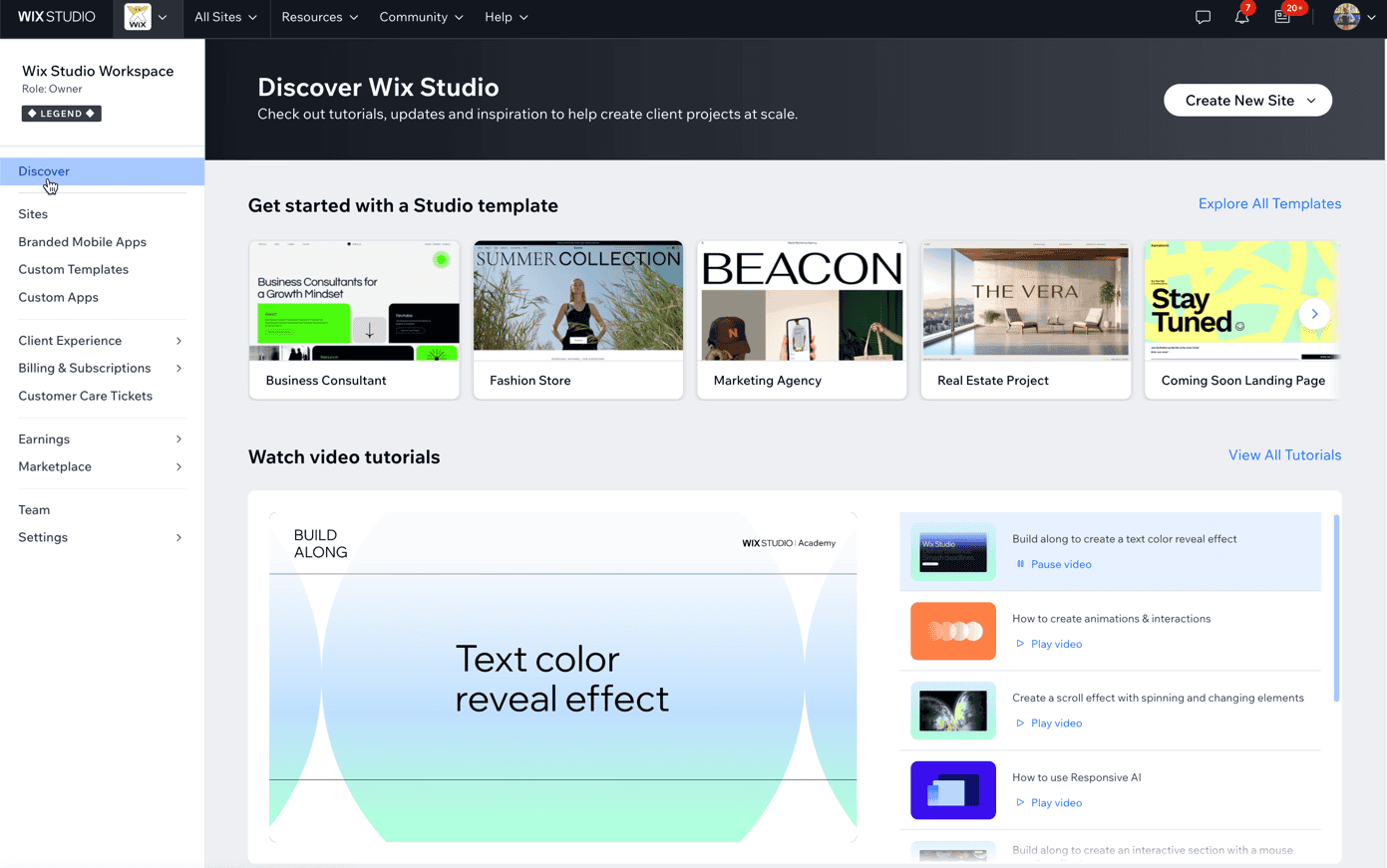Website builders have revolutionized the way individuals and businesses create an online presence. These user-friendly tools allow anyone to design and launch a professional-looking website without coding knowledge. The best website builders of 2025 offer a range of features, from customizable templates to e-commerce capabilities.
Choosing the right website builder depends on specific needs and goals. Some platforms excel at integrating with software-as-a-service tools, while others focus on artificial intelligence-powered features. Certain builders cater to WordPress enthusiasts, and some prioritize marketing and search engine optimization tools. The options vary in terms of customization, pricing, and ease of use.
Top Website Builders for Small Businesses
Choosing the right website builder can be a game-changer for your small business. Here’s a breakdown of some of the best options, ranked based on ease of use, features, and value:
1. Wix

- Ease of Use: Drag-and-drop interface, very beginner-friendly.
- Features: Huge template library, app market for added functionality, built-in SEO tools.
- Pricing: Free plan available, paid plans start at $14/month.
- Best for: Businesses that want creative freedom and a wide range of features.
2. Squarespace

- Ease of Use: Intuitive interface, award-winning templates.
- Features: Strong focus on visual appeal, excellent blogging platform, integrated e-commerce.
- Pricing: 14-day free trial, paid plans start at $16/month.
- Best for: Businesses that prioritize aesthetics and want a professional online presence.
3. GoDaddy

- Ease of Use: Simple and straightforward, AI-powered website creation.
- Features: Fast setup, integrated marketing tools, domain registration and hosting included.
- Pricing: 1-month free trial, paid plans start at $11.99/month.
- Best for: Businesses that want an all-in-one solution and quick setup.
4. Shopify
- Ease of Use: Easy to use, even for beginners, but with a focus on e-commerce.
- Features: Powerful e-commerce platform, extensive app store, wide range of themes.
- Pricing: 3-day free trial, paid plans start at $29/month.
- Best for: Businesses that primarily focus on online sales.
5. WordPress.com
- Ease of Use: Can be slightly less intuitive than other builders, but offers more flexibility.
- Features: Thousands of themes and plugins, powerful blogging capabilities, scalable for growth.
- Pricing: Free plan available, paid plans start at $4/month.
- Best for: Businesses that need a highly customizable website and plan to scale significantly.
A Look At Some Of The Other Top Choices
Here are the website builders wrapped in H3 tags with descriptions:
Weebly
- Description: A user-friendly drag-and-drop builder known for its simplicity and ease of use, ideal for beginners. Offers a free plan with limited features.
Webflow
- Description: A powerful and flexible platform for creating visually stunning and highly customized websites. Requires more technical skills than some other builders.
Duda
- Description: Focuses on building responsive websites for mobile devices and integrates well with other online tools. Popular for creating websites for local businesses.
Hostinger
- Description: Offers a wide range of hosting options and includes a basic website builder as part of their packages. Known for its affordable pricing.
HubSpot Website Builder
- Description: Integrated with other HubSpot marketing tools, making it a strong choice for businesses looking to streamline their marketing efforts.
BigCommerce
- Description: Specifically designed for e-commerce businesses, offering robust features for online stores, including inventory management, order processing, and payment gateways.
Web.com
- Description: A comprehensive platform with website building, marketing, and online store options. Offers a variety of templates and easy-to-use tools.
Framer
- Description: A more advanced platform for creating interactive and motion-rich websites. Popular with designers and developers for its flexibility and design capabilities.
Jimdo
- Description: Offers easy-to-use website builders for both beginners and more experienced users. Known for its user-friendly interface and affordable pricing.
Site123
- Description: A very beginner-friendly builder with an intuitive interface and a strong focus on ease of use. Ideal for those with little to no technical experience.
SiteBuilder
- Description: A platform with a wide range of templates and features, including e-commerce capabilities. Offers a free trial to explore its features.
Key Factors to Consider
- Your Budget: Free plans are great for basic websites, but paid plans offer more features and customization.
- Your Tech Skills: Choose a builder that matches your comfort level with technology.
- Your Website Goals: Consider what you want your website to achieve (e.g., showcase your work, sell products, generate leads).
- Your Design Preferences: Look for a builder with templates that align with your brand aesthetic.
| Website Builder | Ease of Use | Features | Pricing | Best For |
|---|---|---|---|---|
| Wix | Excellent | Wide range | Free plan available, paid plans from $14/month | Creative freedom, diverse features |
| Squarespace | Excellent | Visually focused | 14-day free trial, paid plans from $16/month | Aesthetics, professional look |
| GoDaddy | Very good | All-in-one solution | 1-month free trial, paid plans from $11.99/month | Quick setup, integrated marketing |
| Shopify | Very good (e-commerce focus) | Powerful e-commerce | 3-day free trial, paid plans from $29/month | Online stores, selling products |
| WordPress.com | Good | Highly customizable | Free plan available, paid plans from $4/month | Scalability, advanced features |
Key Takeaways
- Website builders enable non-technical users to create professional websites
- Different platforms offer specialized features for various needs
- Factors like customization, pricing, and ease of use influence the choice of website builder
Top Choice for Website Creation

Wix: A Versatile Platform
Wix stands out as a leading website builder with its user-friendly interface and extensive features. The platform offers hundreds of templates tailored for various businesses and purposes. Users can create mobile-friendly sites easily with Wix’s tools.
E-commerce features are robust, allowing digital downloads and multiple selling options. Wix’s AI-powered design tools add a modern touch to site creation. While a free plan is available, paid plans provide more features.
• Intuitive Editor X interface
• Wide range of widgets and apps
• Excellent uptime and support
• AI-powered design assistance
Wix’s pricing varies based on needs, from basic personal sites to advanced e-commerce solutions.
Optimizing SaaS Integration
Duda’s Web Design Platform
Duda stands out as a robust option for businesses looking to integrate Software as a Service (SaaS) solutions. The platform boasts a user-friendly editor and offers over 100 responsive templates. These templates adapt seamlessly to different screen sizes, ensuring a consistent look on phones and tablets.
Duda’s e-commerce capabilities are noteworthy. The platform supports digital downloads and memberships, making it suitable for various online business models. All plans include unlimited storage and data transfers, which is beneficial for growing businesses.
The platform also provides:
- AI-powered SEO tools
- Detailed traffic analysis
- Custom CSS and HTML integration
While Duda offers many advantages, it’s important to note its higher price point and lack of a free tier. The widget selection is also limited compared to some competitors.
AI-Enhanced Website Creation Tools
Hostinger’s Smart Site Builder
Hostinger’s Website Builder offers a user-friendly platform with AI-powered features. It includes a drag-and-drop interface for easy site creation. The builder comes with an AI theme assistant and text creator to speed up design processes.
Users get unlimited storage and bandwidth. The tool provides a logo maker and photo repository. All plans include a free SSL certificate for security.
While it lacks a free tier, Hostinger bundles this builder with its web hosting services.
Simplest WordPress Site Builder
Bluehost’s Web Creation Tool
Bluehost’s web creation tool makes WordPress site building easy. It offers many templates and stock photos. Users can make online stores with WooCommerce. The tool has good uptime and AI features. SSL is free. Support staff are helpful.
The tool lacks a free plan. Image editing is basic. Changing templates isn’t allowed. Some parts could be better organized.
Top Tools for Digital Marketing and Search Optimization
GoDaddy’s Online Presence Builder
GoDaddy’s website creation tool stands out for its marketing and SEO capabilities. It offers:
- Over 100 templates
- Unlimited storage and data transfer
- Mobile-friendly designs
- AI-powered features
The platform includes:
- SEO Wiz for keyword optimization
- Email marketing tools
- Social media integration
- Automatic sitemap generation
Users benefit from excellent uptime and customer support. A free tier is available, though e-commerce features are limited to higher-priced plans. The builder’s layout customization options may be somewhat restricted for advanced users.
Tailoring Your Site: Top Pick for Customization
Squarespace: A Design Powerhouse
Squarespace stands out for its design flexibility. The platform offers stunning, responsive layouts. Its Fluid Engine tool makes site design more user-friendly.
Squarespace excels in e-commerce, supporting digital downloads. Users can add custom code for advanced tweaks. The blogging feature allows post scheduling.
Key benefits:
- Free SSL certificate
- Unlimited storage and data transfers
- Strong analytics tools
Drawbacks:
- No template switching
- Lacks a free plan
- No phone support
Top Choices for No-Cost Personal Web Pages
Dorik Web Page Creator
Dorik offers a capable free version for building personal websites. Users can create sites without coding knowledge. The platform provides AI tools and excellent uptime.
Key features:
- Intuitive interface
- Code import/export
- Basic image editing
Limitations:
- Few e-commerce options
- Limited custom elements
Top Choices for Website Creation with Bundled Hosting
Web.com’s Site Building Platform
Web.com offers a website builder with integrated hosting. Users get access to many templates and stock photos. The platform includes e-commerce tools and WordPress integration.
Key features:
- Easy-to-use interface
- Built-in web hosting
- Reliable uptime
- Strong customer support
Drawbacks:
- No free plan available
- Limited image editing options
- Cannot change templates after selection
- Short refund period
The service lacks cloud, dedicated, and VPS hosting choices. It suits users who want a simple way to build and host a website in one place.
Simplifying Content Management
Webflow’s User-Friendly Platform
Webflow offers a powerful CMS with AI tools and a vibrant app marketplace. Its free tier and numerous templates provide flexibility. Users enjoy 24/7 chat support and community assistance. However, some templates have extra costs, and storage limits apply.
Simplest Page Editing Tools
Weebly’s User-Friendly Builder
Weebly stands out for its straightforward editing interface. Users can quickly build pages using a drag-and-drop system. The platform offers responsive design themes that look good on all devices.
Key features:
- Easy-to-use editor
- Mobile-friendly templates
- E-commerce capabilities
- Free plan available
Weebly allows selling digital products and provides site statistics. Users can change themes without rebuilding their entire site. All plans include unlimited data transfers.
Top Choice for Previewing Site Templates
Strikingly Site Creator
Strikingly offers an intuitive platform for building websites. Users can easily switch between attractive, responsive themes without starting over. The service boasts excellent uptime and a free tier.
Premium accounts unlock more customization options and pages. Free and basic plans are limited to five pages per site. Strikingly shines in its simplicity but may not suit those seeking extensive customization.
Pros:
- User-friendly interface
- Mobile-responsive designs
- Template switching without rebuilding
Cons:
- Limited customization compared to rivals
- Many features require paid plans
- Page limits on lower tiers
Top Picks for Digital Product Sales
Simvoly’s Digital Marketplace Solution
Simvoly offers a user-friendly ecommerce website builder for digital goods. Its drag-and-drop interface simplifies site creation. The platform supports digital download sales and theme switching.
Simvoly provides site statistics and maintains excellent uptime. However, it lacks photo editing tools and a widget marketplace. The platform also doesn’t offer shipping integrations or a free tier.
Top Free E-commerce Solutions
Ucraft’s Online Store Builder
Ucraft offers a robust platform for creating online stores. Its modern templates and mobile customization options make it easy to design attractive e-commerce sites. Users can collaborate on site editing and access a large image library. The platform provides solid web store features, though some may find object placement tricky. While the free version has limitations, it’s a good starting point for small businesses venturing into e-commerce.
What Are Website Creation Tools?
Website creation tools allow individuals and businesses to build their own websites without coding knowledge. These platforms provide templates, drag-and-drop interfaces, and customization options to create professional-looking sites.
Users can choose from various designs and layouts to suit their needs. The tools often include features like:
- Pre-designed templates
- Customizable color schemes
- Built-in image editors
- Mobile-responsive designs
- E-commerce capabilities
Website builders offer several advantages:
- Cost-effective alternative to hiring a web developer
- Quick setup and launch times
- Easy maintenance and updates
Many platforms also provide hosting services and domain registration. This all-in-one approach simplifies the process of establishing an online presence.
For businesses, a dedicated website can enhance credibility and customer trust. It serves as a central hub for information, products, and services. Personal users benefit from having a professional online portfolio or resume.
Website creation tools cater to various skill levels. Beginners can use simple drag-and-drop interfaces, while more advanced users can access HTML and CSS editing options for greater control.
How Website Builders Simplify Web Creation
Website builders have revolutionized the process of creating an online presence. These tools eliminate the need for extensive technical knowledge, making website creation accessible to everyone. Users can now build professional-looking sites without understanding complex coding languages or server management.
The core of a website builder is its intuitive interface. Most platforms offer a drag-and-drop system, allowing users to place elements exactly where they want them on a page. This visual approach makes it easy to design layouts and add features without writing a single line of code.
Templates form the foundation of many website builder projects. These pre-designed layouts serve as starting points, which users can customize to fit their needs. Platforms typically offer a wide range of templates tailored to different industries and purposes.
Key features of website builders include:
- Social media integration
- Photo galleries
- Blog functionality
- Media players
- E-commerce capabilities
Some advanced builders even allow for member-only areas and password protection, enhancing site security and exclusivity.
Pricing for these services is often affordable, with basic plans starting around $10 per month. E-commerce functionality may increase costs to about $25 monthly. This pricing makes professional web design attainable for small businesses and individuals alike.
Website builders cater to various skill levels. Beginners can create simple sites quickly, while more experienced users can access advanced customization options. This flexibility ensures that as users’ needs grow, their websites can evolve with them.
The mobile-friendly designs offered by these platforms are crucial in today’s smartphone-dominated world. Ensuring websites look great on all devices is now a standard feature, not an extra.
Top Free Website Building Platforms
Free website builders offer an easy way to create an online presence without cost. Many platforms provide free options with varying features. These tools typically include provider branding on your site.
Storage, bandwidth, and customization options differ among free plans. It’s important to review the details of each offering. Some standout free platforms include:
• Wix
• Weebly
• Strikingly
These builders provide generous features in their no-cost versions. Users should consider:
- Storage limits
- Bandwidth restrictions
- Available design templates
- Customization options
While free builders can be a good starting point, they may have limitations for professional use. As your needs grow, paid plans often become necessary for a more polished web presence.
Securing Your Web Address
Choosing and registering a domain name is a crucial step in establishing an online presence. Many website builders offer domain registration services, often including a custom domain with their plans. Some provide a free domain name for the first year when you sign up for an annual plan.
Users can also opt for a subdomain using the builder’s URL (e.g., yourname.sitebuilder.com). This option is often free but less professional. For those who already own a domain from a third-party registrar, most builders allow its use, though they may charge a fee.
When selecting a domain, consider these tips:
• Keep it short and memorable
• Use keywords related to your business
• Avoid hyphens and numbers
• Check for trademark conflicts
Registering early helps secure the desired name before someone else claims it.
Essential Features for Choosing a Website Builder
Website builders offer various tools to create an online presence. Selecting the right one depends on several key aspects.
Templates form the foundation of any site. Top builders provide mobile-responsive designs that adapt to different screen sizes. Some offer industry-specific options tailored for businesses like bakeries or musicians.
Customization capabilities vary between platforms. Most allow changes to colors, fonts, and layouts. The ability to add new pages is crucial. Some builders limit design freedom to maintain visual appeal, while others offer more flexibility.
Content addition tools are vital. Users should be able to insert text, images, buttons, and widgets easily. Third-party integrations expand functionality, allowing features like forms, chat, and social media feeds.
AI-powered tools have become increasingly common. These can generate entire site designs or specific elements like text and marketing strategies based on user input. While AI can save time, human refinement is still necessary for best results.
SEO features help sites rank better in search results. Look for builders that allow easy editing of meta descriptions and title tags.
E-commerce capabilities are essential for online stores. This includes product listings, shopping carts, and secure payment processing.
Pricing structures differ. Some offer free plans with basic features, while others require paid subscriptions for advanced tools. Consider long-term value and scalability.
Ease of use is crucial, especially for those without coding experience. Intuitive interfaces and drag-and-drop editors simplify the design process.
Customer support can make a significant difference. Look for builders offering comprehensive help resources and responsive support teams.
Performance and loading speed impact user experience and search rankings. Choose a builder that creates fast, efficient sites.
Mobile editing allows updates on-the-go. This feature is particularly useful for busy entrepreneurs.
Blogging tools help create and manage content easily. Look for features like post scheduling and categories.
Analytics provide insights into site performance and visitor behavior. This data helps refine marketing strategies.
Export options allow moving content to another platform if needed. Not all builders offer this flexibility.
Domain and hosting options vary. Some include free domains and hosting, while others require separate purchases.
Consider these factors carefully to choose a website builder that aligns with your specific needs and goals.
Mobile Site Design: A Key Factor in Web Success
Mobile-friendly websites play a crucial role in today’s digital landscape. Web designers employ responsive design to adjust content for various screen sizes. Search engines prioritize sites that display well on mobile devices.
Some website builders offer limited control over mobile views. Others provide more flexibility:
- Preview mobile layouts
- Customize mobile-specific elements
- Add welcome pages for mobile users
- Remove incompatible features
Mobile optimization affects:
- User experience
- Search engine rankings
- Site functionality
Web creators should test their sites on multiple devices. Search engines offer tools to check mobile compatibility.
Mobile app-like features can enhance mobile websites. These may include:
- Touch-friendly navigation
- Fast-loading pages
- Streamlined content
Businesses benefit from mobile-optimized sites through increased visibility and improved user engagement. A well-designed mobile experience can lead to higher conversion rates and customer satisfaction.
Top Photography Website Builders
Several website builders cater to photographers’ needs. Squarespace and Wix provide stock photography, enhancing visual appeal. Many platforms offer image editing tools for quick touch-ups.
Photo gallery options differ across platforms. Weebly boasts diverse gallery styles, while GoDaddy’s choices are more limited. Photographers should consider their specific display requirements when selecting a builder.
Some platforms double as blogging tools, allowing easy integration of photos into blog posts. This feature proves valuable for photographers sharing their work and experiences online.
Top E-Commerce Website Builders for Businesses
Editor-Approved Platforms
Shopify stands out as a leading e-commerce platform. It offers robust tools for inventory management and sales features. Businesses can easily set up online stores with customizable templates.
BigCommerce provides comprehensive e-commerce functionality. It supports multi-channel selling and offers advanced product options. The platform integrates with various payment gateways.
For smaller businesses, Square Online offers a user-friendly interface. It seamlessly connects with Square’s point-of-sale system. This makes it ideal for businesses with both physical and online presences.
Wix caters to creative entrepreneurs. It offers a drag-and-drop editor and numerous design templates. The platform includes basic e-commerce options suitable for small to medium-sized businesses.
Each platform has unique strengths:
- Shopify: Best for scalability
- BigCommerce: Ideal for large catalogs
- Square Online: Great for brick-and-mortar expansion
- Wix: Perfect for design-focused brands
Businesses should consider their specific needs when choosing an e-commerce website builder.
Social Integration and Analytics in Website Builders
Website builders offer varying levels of social media integration and site statistics. Many platforms allow users to add Facebook Like and Twitter Follow buttons to their pages. Some even enable the display of social media feeds directly on websites.
Social media features:
- Facebook Like buttons
- Twitter Follow buttons
- Social media feed integration
Website builders differ in their analytics capabilities. Some provide basic traffic data, while others offer more detailed insights. The depth of analytics often correlates with account tiers, with premium plans offering more comprehensive data.
Key analytics features:
- Page views
- Unique visitor counts
- Search terms used to find the site
- Referring sites
- Top-visited pages
Weebly stands out by providing daily page view and unique visitor statistics. It also shows search terms and referring sites. In contrast, Wix and uKit have limited built-in analytics. These platforms encourage users to set up Google Analytics accounts, which may require paid website builder subscriptions.
A drawback of relying on external analytics is the delay in data availability. Users can typically view traffic information from the previous day onwards, rather than real-time or hourly updates.
When choosing a website builder, consider the importance of social media integration and analytics for your specific needs. Platforms with robust built-in tools can save time and provide valuable insights without additional setup.
What is WordPress Hosting?
WordPress hosting is a specialized service tailored for websites built on the WordPress content management system (CMS). This type of hosting provides optimized resources and features specifically designed to enhance WordPress performance and functionality.
WordPress powers 40% of the internet, making it a popular choice for website creation. There are two main versions of WordPress:
- WordPress.org (self-hosted)
- WordPress.com (hosted platform)
WordPress.org is the free, open-source version that requires users to find their own hosting service. Many hosting providers offer managed WordPress plans to simplify the process.
WordPress.com, on the other hand, hosts the software for users, eliminating the need to find separate hosting.
Key features of WordPress hosting include:
- Pre-installed WordPress software
- Automatic updates
- Enhanced security measures
- Optimized server configurations
- WordPress-specific support
WordPress hosting often comes with additional tools like:
- One-click installations
- Staging environments
- Built-in caching
- WordPress-compatible databases
While WordPress offers flexibility and customization options, it may require more technical knowledge compared to simpler website builders. For those new to web development, managed WordPress hosting can provide a more user-friendly experience.
WordPress hosting plans vary in terms of:
- Storage space
- Bandwidth
- Number of websites allowed
- Level of support
Some providers offer unlimited storage and impressive features like free SSL certificates to enhance website security.
When choosing a WordPress hosting plan, consider factors such as:
- Budget
- Expected traffic
- Required features
- Technical expertise
For those seeking a balance between WordPress functionality and ease of use, some website builders offer WordPress-centric options that simplify the process while maintaining the CMS’s core benefits.
Transferring Your Website to a Different Platform
Moving a website to a new builder can be tricky. Many platforms use custom code, making transfers difficult. Some services offer more flexibility than others.
Weebly stands out by allowing users to download standard site server folders. This feature gives website owners more control over their content.
Squarespace provides a unique option. It lets users export their site in WordPress format. This compatibility makes transitions smoother for those switching to WordPress-based platforms.
WordPress.com users enjoy similar transferability benefits. The platform’s open nature allows for easier migration to other hosting services.
When choosing a website builder, consider future flexibility. The ability to move your site later may prove valuable as your needs change.
Top Website Builder Customer Support Features
Website builders offer various support options to help users. Phone callbacks are available from some providers, including free account holders. Many builders have extensive online knowledge bases and FAQs. These resources often answer common questions without contacting support directly.
Support quality varies between services. Some key factors include:
• Response times
• Support channels (email, chat, phone)
• Self-help resources
• Staff knowledge
The best builders provide 24/7 support through multiple channels. They also maintain up-to-date help articles and video tutorials.
Top Website Building Platforms for Small Enterprises
Website builders for small businesses offer vital tools to create an online presence. These platforms provide ease of use and key features tailored to business needs.
Many builders include e-commerce capabilities. This allows companies to sell products directly through their sites. Some platforms offer AI-powered tools to speed up content creation and design tasks.
Marketing and SEO features help businesses get found online. Look for builders with built-in tools to optimize content and improve search rankings.
Key factors to consider:
• Ease of use
• E-commerce functionality
• AI assistance
• Marketing tools
• SEO capabilities
• Mobile-friendly designs
Compare options based on your specific business requirements and budget. Test free trials when available to find the best fit.







